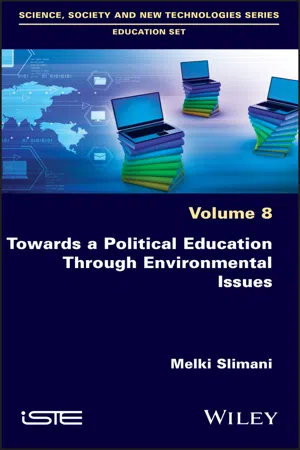
Towards a Political Education Through Environmental Issues
Melki Slimani
- English
- ePUB (apto para móviles)
- Disponible en iOS y Android
Towards a Political Education Through Environmental Issues
Melki Slimani
Información del libro
The growing field of political education through environmental issues is organized around processes, which reach beyond the formal ones found in academic disciplines and national curricula into informal processes (such as social mobilization) and nonformal processes (such as those found in various international educational recommendations).
Using theoretical approaches from the fields of political philosophy and the social sciences, this book develops a simultaneously conceptual and analytical framework for the political in educational content involving environmental issues. This framework is then used to empirically analyze educational content on sustainable development formulated by UNESCO, as well as the Tunisian curriculum.
The theoretical and empirical studies carried out in this book lead to proposed curriculum tags for political education through environmental issues, with the intent of opening this field to inclusion in the didactics of curriculum research.
Preguntas frecuentes
Información
1
The Political Trend in Environmental Issues
1.1. Politics, the political and depoliticization
1.2. The political and the anti-political
- – a discussion of the conceptualization of the political field with its symbolic dimension (the political) and its formal dimension (politics) of Lefort by Gachkov and Blokker. This discussion makes it possible to specify a set of expressions covering the political field: “power”, “depoliticization”, “democracy”, “participation”, “citizenship”, “domination”, “justice” and “liberalism”;
- – the classification2 of EDIs into six metathemes: “environmental politics and environmental change”, “environmental ethics”, “agrifood”, “sustainable development”, “environmental technologies and management” and “transitions”, to explore their political content via the Internet;
- – the association of EDI metathemes with expressions from political/anti-political or politicized/depoliticized discussions in French and English in order to collect a relevant corpus on the Internet;
- – a thorough reading of the collected corpus.
1.3. Environmental and development issues (EDIs) between the political and anti-political or politics and depoliticization: what are the trends?
1.3.1. Issues of environmental politics and environmental change
1.3.1.1. Environmental justice: a category which cuts across environmental politics
- – the question of the degree of shared responsibility for climate change between rich and poor countries (Roberts and Parks 2007a, 2007b);
- – the issue of ecological debt and the injustice of climate change combined with the effects of poverty and environmental degradation (Magrath 2010);
- – the issue of intergenerational domination, which can stem from a violation of the freedom of future generations through climate change (Beckman 2016).
- – local and global environmental politics initiatives (Blanchon et al. 2009) in response to local social movements denouncing situations of environmental injustice, such as exposure to an environmental impact, as well as situations of unequal access to environmental resources and the marginalization of inhabitants around protected areas (Blowers and Leroy 1994; Dozzi 2008; Faburel 2008; Gobert 2008; Gardin 2012);
- – other social movements of environmental politics are responses to global initiatives that introduce social equity into environmental protection. These movements use political ecology as a theoretical tool (Robbins 2012). Political ecology also provides a theoretical basis for discussing issues of “democratization of environmental explanation” in scientific practice between scientific expertise and public participation as a factor of environmental governance (Forsyth 2003).
- – distributive justice dealing with the identification of team beneficiaries and services with high environmental efficiency, such as public transport, sewage treatment plants and other infrastructure. It seeks to distribute justice in the light of environmental harm and effects according to social categories;
- – corrective justice dealing with the correction of the effects of actions and policies causing harm.
Índice
- Cover
- Table of Contents
- Title Page
- Copyright
- Foreword: Laying Down the Principles of Intentional Political Curricula for the Anthropocene World
- Introduction
- 1 The Political Trend in Environmental Issues
- 2 The Political Potential of Environmental Issues
- 3 Political Learning and Socialization in Teaching Environmental Issues
- 4 Methodological Considerations
- 5 The Political within “Education for Sustainable Development Goals”
- 6 The Political within the Tunisian Curriculum
- Conclusion
- Appendices
- Appendix 1: Interviews: Guides and Help Lists
- Appendix 2: Report on Political Elements in the SDG 2030 Agenda and in the Contents of “Education for 2030 SDGs”
- Appendix 3: Report on political elements in the Tunisian Curriculum
- Glossary
- References
- Index
- End User License Agreement